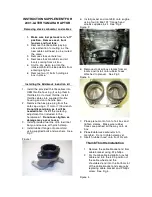
I01�High-voltage�Components
5.�High-voltage�Battery�Unit
71
The�high-voltage�battery�unit�is�the�energy�storage�device�for�the�electric�motor�of�the�I01.�It�is�the
equivalent�to�the�fuel�tank�of�a�conventional�vehicle�with�a�combustion�engine.�Also�in�BMW�active
hybrid�vehicles�there�is�already�a�high-voltage�battery�unit,�which�supplies�the�electric�motor�with
energy.�In�the�BMW�active�hybrid�the�high-voltage�battery�is�charged�when�the�electrical�machine�is
operated�as�an�alternator.�This�happens�during�brake�energy�regeneration�or�by�a�load�point�increase
of�the�combustion�engine.�In�the�I01�the�high-voltage�battery�can�also�be�partially�charged�during
brake�energy�regeneration.�However,�it�is�mainly�charged�using�energy�from�an�external�power
network.�An�optional�range�extender�can�also�provide�electrical�energy�using�a�gasoline�engine�and
another�electrical�machine.�However,�this�is�primarily�used�for�maintaining�the�state�of�charge�when�the
high-voltage�battery�is�already�heavily�discharged.�The�range�of�the�I01�can�be�increased.
5.1.�Overview
The�high-voltage�battery�of�a�vehicle�with�an�electric�motor�is�the�equivalent�to�the�fuel�tank�in�a�vehicle
with�a�combustion�engine:�It�is�the�energy�storage�device�for�the�electric�motor.�In�order�to�achieve
the�desired�range�of�the�I01,�the�amount�of�energy�to�be�stored�is�correspondingly�high,�which�is
why�the�volume�and�weight�of�the�energy�storage�device�are�also�high.�Nevertheless,�some�vehicle
characteristics�were�positively�influenced�by�the�installation�of�the�high-voltage�battery�unit�in�the�Drive
module�of�the�I01:
•
Thanks�to�the�low�installation�location�the�center�of�gravity�of�the�vehicle�is�lowered,�which
reduces�the�roll�tendency�in�bends,�in�particular.
•
The�passenger�compartment�is�not�restricted�by�the�high-voltage�battery�unit.
•
The�high-voltage�battery�unit�is�well�accessible�in�Service,�which�reduces�the�repair�costs.
5.1.1.�Technical�data
The�high-voltage�battery�unit�of�the�I01�is�made�up�of�the�following�fundamental�components:
•
Cell�modules�with�the�actual�battery�cells
•
Cell�supervision�circuits
•
Heat�exchanger�with�coolant�ducts�and�heating
•
Control�unit,�battery�management�electronics�(SME)
•
Wiring�harnesses
•
Safety�box
•
Connections�(electrical,�refrigerant,�venting)
•
Housing�and�fastening�parts.
The�battery�cells�are�supplied�by�Samsung�SDI�to�the�BMW�plant�in�Dingolfing.�There�the�cell�modules
are�assembled�from�the�battery�cells�and�mounted�into�complete�high-voltage�battery�units�with�the
other�components.�The�manufacturer�of�the�SME�control�unit�and�the�cell�supervision�circuit�is�Preh.
The�battery�cells�used�in�the�high-voltage�battery�of�the�I01�are�
lithium-ion
�cells�(cell�type�NMC/LMO
mixture).�The�anode�material�of�lithium-ion�batteries�is�generally�a�lithium�metal�oxide.�The�designation
"NMC/LMO�mixture"�refers�to�the�metals�used�for�this�cell�type:�It�is�a�mix�of�nickel,�manganese�and
cobalt�on�the�one�hand,�and�lithium�manganese�oxide�on�the�other�hand.�The�characteristics�of�the
high-voltage�battery�for�use�in�an�electric�vehicle�were�able�to�be�optimized�through�the�selection�of
















































